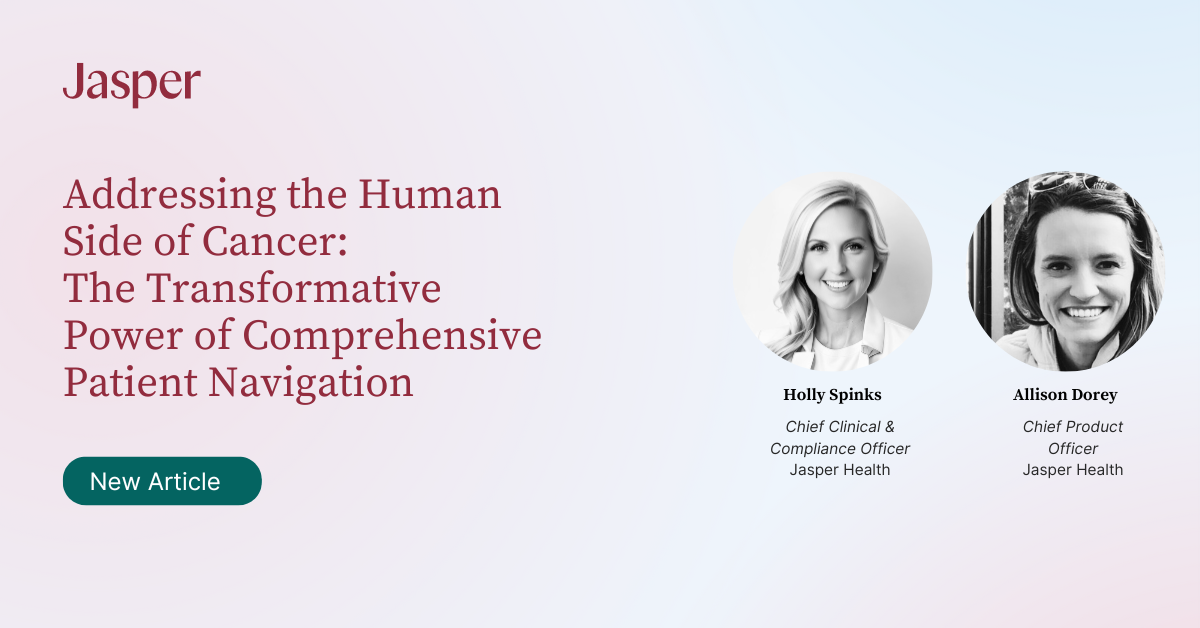Addressing the Human Side of Cancer: The Transformative Power of Comprehensive Patient Navigation


Written by Holly Spinks, Chief Clinical and Compliance Officer, Jasper Health and Allison Dorey, Chief Product Officer, Jasper Health
Last year, across the United States, nearly 2 million people received a life-changing diagnosis of cancer. With those dreaded words, there is typically a flurry of clinical conversations to quickly develop and initiate a treatment plan. But far too often, the intense focus on the physical impact of cancer overshadows a quieter but equally challenging experience–grappling with overwhelming stress and frustration managing the disorganization and fragmentation of our country’s healthcare system. Too often, people affected by cancer find themselves lost in the complexities of diagnosis and treatment, feeling like mere passengers on a turbulent journey.
From rural community clinics to urban Centers of Excellence health systems, there is an urgent need for a transformative approach to support those confronting this relentless disease. For the first time in decades, there is hope. That is because the White House’s Cancer Moonshot initiative announced in November 2023 a comprehensive plan for patient navigation to become a set of reimbursable services.
Patient navigation acts as the compass guiding individuals through the labyrinth of a cancer diagnosis and bridges the significant divide between medical expertise and the lived experience of the patient. In fact, existing data suggest that 50% of cancer deaths could be prevented if people are supported in making healthy lifestyle changes and engage in recommended cancer screening examinations.
The inclusion of billing codes for health insurers, beginning with Medicare, to compensate for patient navigation services marks a pivotal step forward in our commitment to providing comprehensive and compassionate cancer care in this country.
Now, just as a cancer patient’s CT scan or blood draw is viewed and compensated as a critical step in their treatment plan, navigation will fall under the same billing structure. This is a ‘game changer’ for the millions affected by cancer and for their families who are so often shocked, isolated, confused, and unprepared for what they can do to put themselves in the best position for recovery.
With this announcement, the Centers for Medicare & Medicaid Services is acknowledging the profound pain and personal struggle of so many American families. Now Navigators have a viable path to providing empathetic, personalized support nation-wide. Nurses, social workers, financial aid counselors and other supportive care professionals can better coordinate care, build self-advocacy skills, hone personal goals, help avoid unnecessary hospital visits, and reduce frustration with the fragmented reality of healthcare in this country.
For David, who recently found out his multilineage dysplasia has returned, he can have an extra hour to walk through his treatment plan and develop coping strategies to address his increased stress levels. For Roberta, who’s been told she needs to gain weight before a critical upcoming colorectal surgery, she can work with a nutritionist to customize a meal plan with her favorite types of smoothies. For Cassidy, who received discouraging news on her leukemia’s progression, she can have more support searching for a potentially life-saving clinical trial.
The White House’s Cancer Moonshot Initiative is an inspiring and diverse team of professionals across industries and backgrounds who are coming together to drive groundbreaking innovation, striving to accelerate progress in preventing, diagnosing, and treating cancer. It’s a meaningful response to a decades-long call to move from disease-centered approaches to patient-centered models in healthcare.
It is no secret that the COVID-19 pandemic inflicted immense strain on medical staff across this country with unprecedented rates of provider burnout and health system budget cuts. Nurses are strained from long hours, social workers jobs have been cut, and counselors are difficult to come by. With these new billing codes, there’s new hope for a funding model to rebuild the backbone of supportive care that individuals affected by cancer so desperately need.
Let’s give every American with cancer a Care Navigator so that no one faces the daunting journey of cancer feeling alone or unprepared.